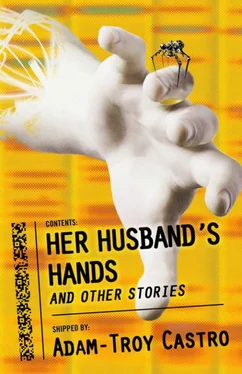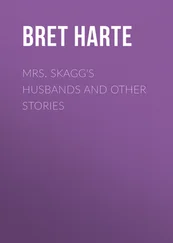Adam-Troy Castro
HER HUSBAND’S HANDS
AND OTHER STORIES
Back in 1968, I met one of my favorite people—Robert Bloch.
Yes, I know, this is supposed to be an introduction to Adam-Troy Castro’s collection of stories. I’ll get there, I promise. But first I want to talk about Robert Bloch.
Bloch is mostly known as the author of Psycho. He is also known for saying that he has the heart of a ten year old boy—in a jar on his desk.
But I remember Bloch as just an all-round good guy. He was one of the funniest and most charming men in the science fiction community, often in demand as a speaker and toastmaster at conventions. One of his best lines came from his sale of Psycho to Alfred Hitchcock—actually, not Hitchcock, but to a dummy company Hitch had set up so he wouldn’t have to pay as much for the movie rights if his name were attached.
According to the story, Bloch only received $750 from that dummy company. So Robert Bloch went on to claim that he was the forerunner of the gay liberation movement, because he was the first man screwed by Alfred Hitchcock. (This is a joke I have since purloined and used with another producer’s name inserted.)
But the reason I mention Bloch is because of another joke he once told from the podium. He said he was passing a room where he heard two male voices talking, one saying, “I’ll put yours in mine if you’ll put mine in yours.” He assumed it was a gay liaison, but when he opened the door it was only two authors assembling anthologies, agreeing to publish each other’s stories. (This was during the 70’s, a time when many SF authors were also editing anthologies. I did five myself.)
That joke came immediately to mind when I sat down to type this introduction. Because Adam-Troy Castro and I are trading introductions. He wrote a generous introduction to my story collection, In the Deadlands, from BenBella Books, available on Amazon, and in return I am writing an introduction to this story collection. I’ll put his in mine and he’ll put mine in his. Robert Bloch can snicker all he wants, I’m still not taking a shower with him.
Let me step away from the homoerotic references and recontextualize all of the above as literary back-scratching (with everyone keeping their clothes on) and leap ahead to the subject at hand.
Adam-Troy Castro is a cherished friend. This in itself is remarkable because I am well-known as a cantankerous, reclusive, grumpy old curmudgeon. But Adam-Troy is one of the few people who can tell me that I’m full of shit and still remain a cherished friend, because when he says it, he’s not only right—he’s insightful.
(In 1995 at the Nebula Awards Banquet, held in some posh hotel in New York City, I was attempting to be modest, while holding a Nebula award under my arm. It is not possible to be modest with a Nebula trophy under your arm. Adam-Troy Castro stopped me from digging my big toe in the sand and saying, ‘Aw, shucks,’ and told me I was full of shit. He was right. I do not know how to savor a moment of acknowledgment. Fortunately, that kind of embarrassment does not happen often, so I haven’t had to learn. But the important part of that story is that he was right.)
Since then, Adam and I have had few more occasions to break bread together—most memorably that marvelous Brazilian restaurant in Las Vegas, the one where the waiters continued slicing huge slabs of various animals onto our plates until I had to pull a sidearm to stop them because my gut had become so distended I feared my ability to stand might be permanently impaired—but Adam and his wife Judi remain two of the most charming dinner companions this side of Paul DeFilippo and Deb. (This is shameless name-dropping on my part, but it’s still true.)
Much more relevant is that Adam-Troy and I engage in almost daily exchanges online, often on Facebook, sometimes in private messages or emails, and once even by phone, I think. Usually, these conversations are serious, rigorous, and important enough to slow down and pay serious attention.
You really have to like someone to put up with them on a daily basis. Especially if you’re not related to them. But this kind of mutual affection is something that feels unique to the community of science fiction writers. At least, in my not-too humble opinion.
In most other environments, particularly television and movies, writers often behave like bitchy little girls or FBI agents. The highest compliment any Hollywood writer can give any other is healthy disrespect. From there it’s all downhill. The rest is a demonstration of backstabbing, frontstabbing, malicious name-calling, and lies. (Well, all writers are liars—the good ones get paid for it.) Hollywood writers will repeat the most abhorrible career-killing stories about other writers, all in pursuit of the illusory staff job or possible script assignment.
Try this experiment. Next time you’re having lunch in any restaurant within shouting distance of a studio, ask your waiter how the screenplay is coming along. This will give you some idea of the level of desperation in that particular job market.
Contrast this with the science fiction community.
This is my experience. SF and fantasy writers not only respect each other, they admire each other. Get a group of these authors together and within fifteen minutes they’ll be listing the writers who influenced them, the books they loved growing up, and the things they’ve learned from each other. Introduce two writers to each other at a convention and you’re likely to hear simultaneous cries of, “I loved your book—” I am not making this up. I’ve been in the center of this transaction more times than I can remember, once even with a Pulitzer Prize winner. It’s weird and embarrassing and joyous.
But even beyond that, even if a writer has not been able to keep up with the torrent of new novels pouring out of several thousand computers every month, science fiction and fantasy writers tend to have a genuine respect for each other—because only they know how hard it really is.
Take any other genre—romance, history, horror, detective, western, whatever—and the rules are already in place. The milieu is established, the resources for research are readily available, the format is understandable.
Not so, science fiction.
Science fiction requires world-building. Everything. It requires a level of research beyond anything required by any other genre. It demands the mutual skills of extrapolation and speculation. It demands awareness of sociology, anthropology, psychology, as well—because you’re not only creating an environment, you’re predicting how human beings will live and act and react to each other within that environment. And… the hardest part of all, it has to be believable. The author has to believe in it before the reader can.
The reason there are so many bad science fiction movies, TV shows, novels, and stories is that science fiction is hard —it’s not about eye-candy, it’s not about special effects, it’s not about techno-babble, it’s about that strange and terrible place where human beings are fundamentally challenged by the possibilities of the world that the author has constructed around them. This is what (most) science fiction writers know about themselves and each other—that any author who has that kind of grasp on the genre well enough to turn out a consistently competent effort is worthy of serious respect.
And that brings me—finally—to Adam-Troy Castro.
As I said above, we’re friends. As I said above, we’re trading introductions. But putting both of those things aside, it’s still a privilege to write an introduction to this collection of stories—because Adam-Troy Castro is a damn good writer.
Читать дальше












